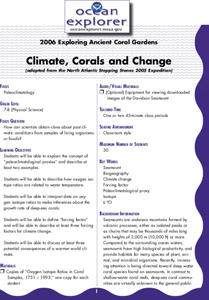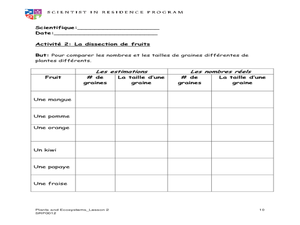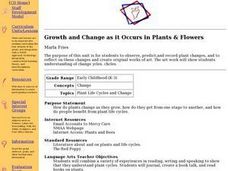Curated OER
Plant Parts and Functions
Fifth graders examine two or three unfamiliar flowers or fruits, such as eggplant and mango and realize that each flower or fruit comes from a flowering seed plant. They then identify the plants.
Curated OER
Succession in the Classroom
Middle schoolers investigate their environment by growing plants in class. In this botany lesson plan, students discuss the lifespan of plants and animals and how they must be cared for continuously over time. Middle...
Curated OER
Sunflowers (Grades 3-8)
Students examine sunflowers and discuss the importance of sunflower cooking oil and seeds. They view pictures, read books, sing sunflower songs, and grow flowers from sunflower seeds.
Curated OER
Water Issues on Puerto Rico and Oahu: A Comparison of Two Islands
Fifth graders explore how the tow islands receive and use fresh water. They also address some of the threats to the fresh water supply on each island. Students explore the lesson objectives through water cycle models and experiments.
Curated OER
Dry-Land Kalo-Growing New Plants from Stems
Students explore Hawaiian plants. In this Hawaii culture and botany lesson, students plant the haha(stem) of a taro plant. Students listen to Hawaiian myths about the taro plant and chorally speak a Hawaiian chant of protection. Students...
Curated OER
Structure and Function of Bulbs, Corms and Rhizomes
Students explore the concept of philanthropy and why people give. They investigate the importance of the tulip to Holland and the tradition of giving flowers away. They begin to explore the life cycle of tulips and dissect a bulb to...
Curated OER
Global Greenup
Students utilize satellite images to track the life cycle of vegetational growth over a large area. Animal migratory patterns are compared to this cycle.
Curated OER
Plant Growth
First graders investigate how seeds are moved and how plants grow. In this plant growth instructional activity, 1st graders listen to stories, play a game, and view a PowerPoint about plant growth. Students examine various seeds...
Curated OER
Two Beets Or Not Two Beets—What Is Your Question?
Students use the scientific method to test an idea regarding the structures of a plant as it supports the biological evidence for life. In this growing roots lesson, students use organizing sheets to record their findings. Students...
Curated OER
Finding, Gathering, Saving Seeds
Learners understand the importance of saving seeds. In this saving seeds lesson, students dry out seeds for later use planting. Learners recognize that one plant may have many seeds.
Curated OER
Plants, Ecology, Seed Planting
First graders use senses to examine objective or events, then gather and interpret data with instruments. They design invention to support or refute hypothesis, then generate, record, and organize data. They improve environmental...
Curated OER
The Radish Experiment
First graders grow radishes. In this Science instructional activity, 1st graders observe the growth of radishes in both the light and dark. Students discuss what plants need to live.
NOAA
Climate, Corals and Change
Global warming isn't just an issue on land; deep ocean waters are also showing troubling signs. Young scientists learn more about deep water corals and the many recent discoveries researchers have made. Then they examine data related to...
Curated OER
Energy Generating a Culture: Early American Coal Miners and Coal Mining Culture
Learners calculate how much coal they use based on their electric power usage. In this environmental science lesson, students trace the history of coal mining in US. They write a letter to USPS to encourage them to create coal mining...
Curated OER
WET Science Lesson #3: Comparison of Aquatic and Terrestrial Plants
Elementary life science explorers compare and contrast aquatic and terrestrial plants (elodea and soybeans) in a Venn diagram. Some background information is provided to support direct instruction, and general instructions are provided...
Curated OER
Mr. Potato
Students identify the nutrients found in potatoes and the process of growing a potato plant. They role-play the potato life cycle, view a flannel board story, plant grass seeds in potatoes, and play hot potato.
Curated OER
Super Seeds Super Grains
Students explore the life cycle of plants. In this agricultural lesson, students discover the two ways that seeds germinate. Students dissect seeds and record data. Resources are provided in French and English.
Curated OER
City Wildlife in a Vase
Students examine a still-life painting. They discuss the observation of nature by scientists and artists and explore the symbolism of biological life cycles depicted in a painting.
Curated OER
Web of Life Game: Trout
Students explore the concept of food webs. In this food web lesson plan, students demonstarte the connection between species. Students use a ball of string show how the food web works, then have a class discussion.
Curated OER
Stomata: Microscopic Openings that Let Plants Breathe
Young scholars participate in a lab experiment to observe and measure the opening and closing of stomata. They focus on photoperiod, locate and identify stomata on a leaf and explain the role of stomata in the daily functioning of a plant.
Curated OER
The Tiny Seed Lesson Plan Guide
Not only is this lesson about story retell, main events, and making predictions, it's also about plants. Youngsters will read the tale, The Tiny Seed as they explore the plant life cycle and early literacy skills. The lesson is very...
Curated OER
Growth and Change as it Occurs in Plants and Flowers
Students work together to observe plants and flowers through their life cycle. In groups, they make predictions and record changes in a journal. Using this information, they create their own original artwork and discuss the plants life...
Curated OER
How a Seed Grows and Who Grows It
First graders explore biology by viewing PowerPoint presentations in class. In this plant life lesson, 1st graders identify the life cycle of a plant and how to properly plant a seed outside. Students view a movie about plant life and...
Curated OER
Biodiversity in Illinois-Pond Habitats
Second graders construct a pond habitat in the classroom using a small swimming pool partially filled with water, real cattails, a tree log adjoining, and plastic animal life appropriate to a pond setting. They examine the frog in detail...























